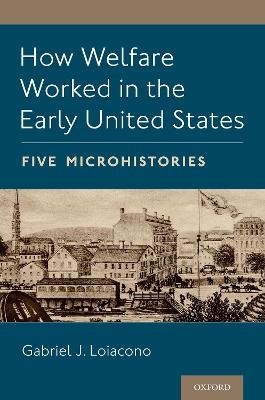
How Welfare Worked in the Early United States
Oxford University Press Inc (Verlag)
978-0-19-751543-3 (ISBN)
What was American welfare like in George Washington's day? It was expensive, extensive, and run by local governments. Known as "poor relief," it included what we would now call welfare and social work. Unlike other aspects of government, poor relief remained consistent in structure between the establishment of the British colonies in the 1600s and the New Deal of the 1930s. In this book, Gabriel J. Loiacono follows the lives of five people in Rhode Island between the Revolutionary War and 1850: a long-serving overseer of the poor, a Continental Army veteran who was repeatedly banished from town, a nurse who was paid by the government to care for the poor, an unwed mother who cared for the elderly, and a paralyzed young man who attempted to become a Christian missionary from inside of a poorhouse. Of Native, African, and English descent, these five Rhode Islanders utilized poor relief in various ways. Tracing their involvement with these programs, Loiacono explains the importance of welfare through the first few generations of United States history.
In Washington's day, poor relief was both generous and controlling. Two centuries ago, Americans paid for--and many relied on--an astonishing governmental system that provided food, housing, and medical care to those in need. This poor relief system also shaped American households and dictated where Americans could live and work. Recent generations have assumed that welfare is a new development in the United States. This book shows how old welfare is in the United States of America through five little-known, but compelling, life stories.
Gabriel J. Loiacono is Associate Professor of History at the University of Wisconsin Oshkosh. He has spent much of the past two decades studying the ways early Americans responded to poverty. Loiacono has published articles in The Atlantic, Rhode Island History, New England Quarterly, and Journal of Policy History.
Introduction
Chapter 1: Overseer of the Poor: How William Larned Spent Public Funds on the Needy
Chapter 2: Warned Out: How Cuff Roberts was Banished by Poor Law Officials
Chapter 3: Healthcare for the Poor: How "One-Eyed" Sarah Saved Paupers' Lives
Chapter 4: Hard-working Single Mother: Lydia Bates and Poor Relief in a Small Town
Chapter 5: Stuck in the Poorhouse: William Fales and the Experience of Institutionalization
Epilogue: What Can We Learn from These Five Lives?
Acknowledgements
Notes
Bibliography
| Erscheinungsdatum | 04.05.2021 |
|---|---|
| Verlagsort | New York |
| Sprache | englisch |
| Maße | 231 x 155 mm |
| Gewicht | 340 g |
| Themenwelt | Geschichte ► Teilgebiete der Geschichte ► Kulturgeschichte |
| Sozialwissenschaften ► Pädagogik ► Sozialpädagogik | |
| Sozialwissenschaften ► Soziologie | |
| ISBN-10 | 0-19-751543-6 / 0197515436 |
| ISBN-13 | 978-0-19-751543-3 / 9780197515433 |
| Zustand | Neuware |
| Haben Sie eine Frage zum Produkt? |
aus dem Bereich


